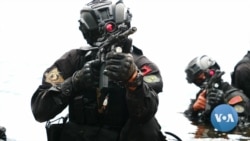ກອງກຳລັງສະຫະລັດ ກຳລັງຝຶກຊ້ອມກອງກຳລັງທະຫານອາຟຣິກາຕາເວັນຕົກ ເພື່ອຕ້ານໄພຂົ່ມຂູ່ຈາກການກໍ່ການຮ້າຍທີ່ກຳລັງແຜ່ລາມອອກຈາກພາກພື້ນ ຊາເຮລ (Sahel). ໃນຂະນະດຽວກັນ, ຜູ້ຊ່ຽວຊານດ້ານຄວາມປອດໄພ ກ່າວວ່າ ເບີກິນາ ຟາໂຊ (Burkina Faso) ແລະ ມາລີ (Mali) ຕົກຢູ່ເປັນຂອງກຸ່ມກໍ່ການຮ້າຍໂດຍພື້ນຖານແລ້ວ, ໝາຍຄວາມວ່າສະຫະລັດ ແລະພັນທະມິດດ້ານຄວາມໝັ້ນຄົງກຳລັງຫາທາງຄວບຄຸມຄວາມຂັດແຍ່ງຢູ່ໃນເຂດຊາເຮລ ແທນທີ່ຈະຢຸດມັນທັງໝົດ. ເຮນຣີ ວີລກິນສ໌ ມີລາຍງານເລື້ອງນີ້ ຈາກ ໂຊກາໂກປ, ຂອງການາ, ເຊິ່ງອາດນາສັກ ຈະນຳເອົາລາຍລະອຽດມາສະເໜີທ່ານໃນອັນດັບຕໍ່ໄປ.
ກອງທັບຈາກ ໂມຣົກໂກ (Morocco) ແລະ ການາ (Ghana) ກຽມພ້ອມສໍາລັບການໂຈມຕີເໜືອຫາດຊາຍ ທີ່ເປັນສ່ວນຫນຶ່ງຂອງການຝຶກປະຕິບັດການພິ ເສດ ຟລິນທ໌ລັອກ (Flintlock), ເຊິ່ງເປັນການຊ້ອມລົບປະຈໍາປີໃນອາຟຣິກາຕາເວັນຕົກທີ່ນໍາພາໂດຍສະຫະລັດ, ເຊິ່ງໃນປີນີ້ ໄດ້ຈັດຂຶ້ນໃນໄອວໍຣີ ໂຄສທ໌ (Ivory Coast) ແລະ ການາ.
ທະຫານຄົນນຶ່ງຈາກໜ່ວຍງານເຮືອພິເສດຂອງການາ ເຊິ່ງປະຕິເສດທີ່ຈະເປີດ ເຜີຍຊື່ ດ້ວຍເຫດຜົນດ້ານຄວາມປອດໄພ ໄດ້ອະທິບາຍການຝຶກຊ້ອມວ່າ:
“ມັນເປັນເວລາສອງອາທິດ ຂອງການຝຶກອົບຮົມຢ່າງເຂັ້ມຂຸ້ນ, ແລະ ບາງສ່ວນຂອງການຝືກອົບຮົມ ລວມມີການວາງແຜນພາລະກິດ; ການຂຶ້ນເຮືອ, ການຍຶດ ແລະ ຄົ້ນຫາ; ການເກັບຫຼັກຖານຈາກພື້ນທີ່ ຢ່າງເປັນລະບົບ. ພວກເຮົາໄດ້ທຳການເກັບຫຼັກຖານຈາກພື້ນທີ່ທີ່ລະອຽດອ່ອນ.”
ເຈົ້າໜ້າທີ່ສະຫະລັດຄົນນຶ່ງທີ່ດຳເນີນການຊ້ອມລົບດັ່ງກ່າວໄດ້ຊີ້ແຈງວ່າ ການາມີບົດບາດອັນໃຫຍ່ຫຼວງ ໃນຄວາມພະຍາຍາມດ້ານການຮັກສາຄວາມໝັ້ນຄົງ, ຍ້ອນຂັດແຍ່ງທີ່ແກ່ຍາວມາເປັນເວລາຍາວນານ ກັບກຸ່ມ ອາລ-ກາອີດາ (al-Qaida) ແລະພວກຫົວຮຸນແຮງລັດອິສລາມໄດ້ແຜ່ລາມໄປທາງພາກເໜືອຂອງບັນດາປະເທດຊາຍຝັ່ງອາຟຣິກາຕາເວັນຕົກ.
ພົນເຮືອເອກ ມີລທັນ ແຊນສ໌ (Milton Sands), ຜູ້ບັນຊາການໜ່ວຍປະຕິບັດງານພິເສດຂອງສະຫະລັດ ທີ່ຮັບຜິດຊອບອາຟຣິກາ ກ່າວວ່າ
"ແນ່ນອນ, ພວກເຮົາມີຄວາມກັງວົນກ່ຽວກັບໄພຂົ່ມຂູ່ຈາກການກໍ່ການຮ້າຍທີ່ມາຈາກພາກເຫນືອ, ແລະ Flintlock ແມ່ນແນ່ນອນວ່າ ກຳລັງຈະດຶງພັນທະມິດຂອງພວກເຮົາມາຮ່ວມກັນ ເພື່ອຊ່ວຍປ້ອງກັນໄພຂົ່ມຂູ່ດັ່ງກ່າວ. ຂ້ອຍຄິດວ່າຈາກປະຊາຄົມສາກົນ, ພວກເຮົາໄດ້ສຸມໃສ່ ການາ ຢ່າງຈິງຈັງ. ການາເປັນສູນກາງຂອງສະຖຽນລະພາບ ແລະຄວາມສາມາດທີ່ແທ້ຈິງຢູ່ໃນຊາຍຝັ່ງອາຟຣິກາຕາເວັນຕົກ."
ນັກວິເຄາະກ່າວວ່າ ຄວາມພະຍາຍາມດ້ານຄວາມໝັ້ນຄົງຂອງສະຫະລັດ ກຳລັງປ່ຽນຄວາມສົນໃຈຈາກປະເທດທີ່ບໍ່ມີທາງອອກສູ່ທະເລ ໄປທາງພາກເໜືອ, ເຊັ່ນ ຈາກເບີກີນາ ຟາໂຊ ແລະ ມາລີ, ມາທີ່ ຊາຍຝັ່ງອາຟຣິກາຕາເວັນຕົກ.
ລັດຖະບານ ເບີກີນາ ຟາໂຊ ແລະ ມາລີ ພົບຄວາມຫຍຸ້ງຍາກໃນການຢຸດຢັ້ງການໂຈມຕີ ແລະ ການເຄື່ອນຍ້າຍກຳລັງທາງທະຫານຂອງກຸ່ມຕິດອາວຸດ, ເຊິ່ງນຳໄປສູ່ຄວາມບໍ່ໝັ້ນຄົງຂອງທັງສອງປະເທດ.
ເມື່ອຖາມວ່າຄວາມຄັດແຍ່ງກັບກຸ່ມກໍ່ການຮ້າຍ ໃນ ເບີກີນາ ຟາໂຊ ໄດ້ພ່າຍແພ້ເປັນທີ່ຮຽບຮ້ອຍແລ້ວແທ້ບໍ່, ທ່ານ ໄມໂຄລ ເຊີກິນ (Michael Shurkin), ຜູ້ອຳນວຍການຂອງໂຄງການສາກົນຫຼາຍໆໂຄງການ ຢູ່ທີ່ 14 North Strategies, ເຊິ່ງເປັນບໍລິສັດທີ່ປຶກສາທີ່ສຸ່ມໃສ່ອາຟຣິກາ, ໄດ້ຕອບວ່າ
“ຂ້ອຍຄິດວ່າ ສ່ວນໃຫຍ່ພວກເຮົາສາມາດເວົ້າແບບນັ້ນໄດ້. ຂ້ອຍຫມາຍຄວາມວ່າ, ມັນຍັງມີລັດຖະບານໃນປະເທດມາລີ ແລະຍັງມີລັດຖະບານໃນປະເທດ ເບີກີນາ ຟາໂຊ, ແລະພວກເຂົາຍັງຄວບຄຸມບາງພື້ນທີ່, ແຕ່ຂ້ອຍຄິດວ່າ ຄວາມເປັນຈິງແມ່ນ ປະຊາກອນສ່ວນໃຫຍ່ ໃນປະເທດເຫຼົ່ານີ້ ບໍ່ໄດ້ຢູ່ພາຍໃຕ້ການຄວບຄຸມຂອງລັດຖະບານອີກຕໍ່ໄປ."
ທ່ານນາງ ອາເນລີສ ເບີນາດ (Aneliese Bernard) ຈາກບໍລິສັດທີ່ປຶກສາດ້ານຄວາມໝັ້ນຄົງ ທາງຍຸດທະສາດແມ່ນອະດີດທີ່ປຶກສາຂອງສໍານັກງານດ້ານຄວາມຂັດແຍ່ງ ແລະ ການດຳເນີນງານດ້ານຄວາມໝັ້ນຄົງ ຂອງກະຊວງການຕ່າງປະເທດ ໃນ ໄນເຈີ. ນາງບອກ ວີໂອເອ ວ່າ ສະຫະລັດເບິ່ງຄືວ່າຈະເພີ່ມການຄວບຄຸມ ໄພຂົ່ມຂູ່ດ້ານການກໍ່ການຮ້າຍຈາກກຸ່ມຊາເຮລ Sahel ຂຶ້ນ, ແທນທີ່ຈະພະຍາຍາມປ້ອງກັນ.
"ຂ້ອຍຄິດວ່າຮູບແບບຂອງການຄວບຄຸມ ຈະເລີ່ມເກີດຂື້ນ ໃນລະດັບທີ່ຮຸນແຮງ ຫຼາຍຂຶ້ນ, ເຊິ່ງພວກເຮົາເລີ່ມເສີມຂະຫຍາຍການປ້ອງກັນຊາຍແດນທາງພາກເຫນືອ ຂອງບັນດາລັດທີ່ຢູ່ເຂດຊາຍຝັ່ງທະເລ ຂອງອາຟຣິກາຕາເວັນຕົກ ທີ່ຂ້ອຍໄດ້ກ່າວເຖິງ, ຕ້ອງໃຫ້ແນ່ໃຈວ່າລັດອື່ນໆ ໃນຊາຍຝັ່ງທະເລອາຟຣິກາຕາເວັນຕົກ ຍັງຄົງເຂັ້ມແຂງ ເທົ່າທີ່ຈະເປັນໄປໄດ້, ແຕ່ພວກເຮົາຕ້ອງຮັກສາພັນທະມິດທີ່ສຳຄັນຂອງພວກເຮົາໃນໄນເຈີ.”
ນັກວິເຄາະກ່າວວ່າ, ສະຫະລັດ ກຳລັງໃຫ້ຄວາມສົນໃຈຕໍ່ຄວາມຂັດແຍ່ງ ຢູ່ຊາເຮລ ຫຼາຍຂື້ນ ເນື່ອງຈາກບັນດາປະເທດມະຫາອຳນາດ ຄືຣັດເຊຍ ແລະຈີນ ເລີ່ມສະແດງຄວາມສົນໃຈ ແລະມີອິດທິພົນໃນພາກພື້ນນີ້ຫຼາຍຂຶ້ນ.
ລັດຖະມົນຕີການຕ່າງປະເທດ ທ່ານ ແອນໂທນີ ບລິງເກນ ໄດ້ໄປຢ້ຽມຢາມ ເຂດຊາເຮລໃນອາທິດຜ່ານມາ ເພື່ອໃຫ້ຄຳໝັ້ນສັນຍາໃນການສະໜັບສະໜູນ, ໃນຂະນະທີ່ຮອງປະທານາທິບໍດີ ທ່ານນາງ ຄາມາລາ ແຮຣີສ ມີກຳນົດຈະໄປຢ້ຽມຢາມ ການາໃນທ້າຍເດືອນນີ້.
U.S. forces are training West African troops to counter the growing terror threat spreading from the Sahel region. Meanwhile, security experts say Burkina Faso and Mali have essentially fallen to terrorist groups, meaning the U.S. and security partners are now looking at containing the Sahel conflict rather than stopping it entirely. Henry Wilkins reports from Sogakope, Ghana.
Troops from Morocco and Ghana get ready for an over-the-beach raid as part of Flintlock, the annual U.S.-led military exercise in West Africa, which this year took place in Ivory Coast and Ghana.
A soldier from the Ghanaian Special Boat Service, who declined to be named for security reasons, described the exercises.
“It's been two weeks of intensive training, and some of the areas included mission planning; vessel boarding, seize and search; tactical site exploitation. We did sensitive site exploitation.”
One of the U.S. officers running the exercise hinted that Ghana has a big role to play in security efforts, as a long-running conflict with groups linked to al-Qaida and Islamic State militants spreads to the north of coastal West African countries.
Rear Admiral Milton Sands is in charge of United States Special Operations Command
“We are, of course, concerned about the terror threat coming from the north, and Flintlock is absolutely about pulling our partners together to help protect against that threat. I think from the international community, we’re really focused on Ghana. Ghana is a center of stability and real capability in coastal West Africa.”
Analysts say U.S. security efforts are shifting focus from landlocked countries to the north, like Burkina Faso and Mali, to coastal West Africa.
The Burkina Faso and Mali governments have struggled to halt attacks and military advances by militant groups, leading to instability in both countries.
Michael Shurkin is director of global programs at 14 North Strategies, an Africa-focused consultancy. Asked if the conflict against terror groups in Burkina Faso has essentially already been lost, he replied…
“I think to a large extent we can say that. I mean, there is still a government in Mali and there is still a government in Burkina Faso, and they still control some areas, but I think the reality is that large portions of the populations in these countries are no longer under government control.”
Aneliese Bernard of Strategic Stabilization Advisors is a former adviser for the U.S. Department of State’s Bureau for Conflict and Stabilization Operations in Niger. She told VOA that the U.S. appears to be increasingly looking to contain the terror threat from the Sahel instead of trying to prevent it.
“I do think that a version of containment is going to start to take place at a more aggressive level, wherein we start to fortify the northern borders of the coastal West African states that I mentioned, ensure that all the other coastal West African states remain as strong as possible, but keep our key alliance in Niger.”
Analysts say that the U.S. is paying more attention to the Sahel conflict as great powers like Russia and China begin to show more interest and influence in the region.
Secretary of State Anthony Blinken visited the Sahel last week to pledge support, while Vice President Kamala Harris is due to visit Ghana later this month.





